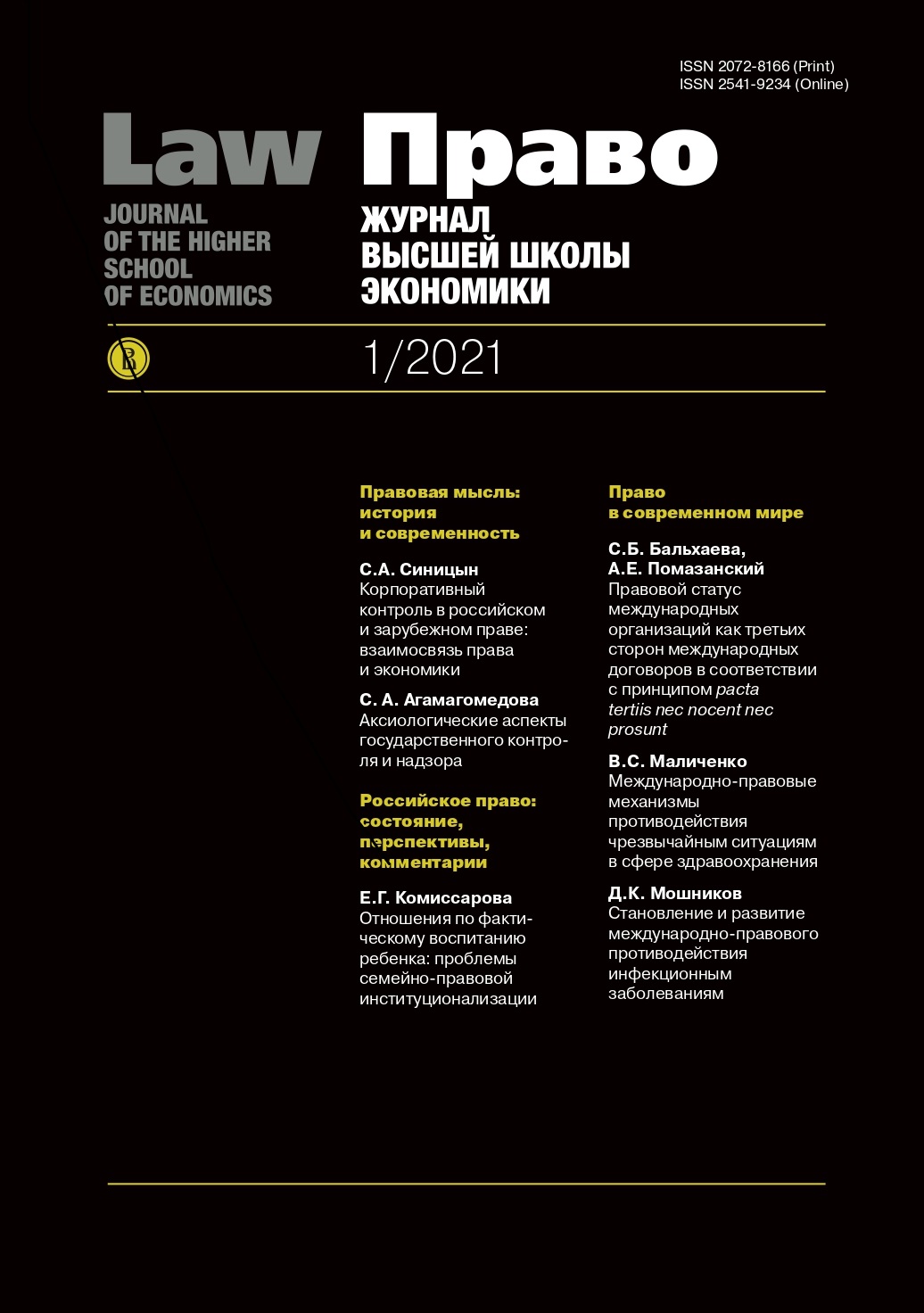Правовой статус международных организаций как третьих сторон международных договоров в соответствии с принципом pacta tertiis nec nocent nec prosunt
Аннотация
В статье рассматривается генезис принципа pacta tertiis nec nocent nec prosunt (договоры не вредят и не благоприятствуют третьим лицам) в праве международных договоров по отношению к международным организациям. Данный принцип, берущий свое начало из римского права, получил воплощение в праве международных договоров благодаря соответствующим положениям Венской конвенции о праве договоров между государствами и международными организациями или между международными организациями 1986 г. Авторами отмечается ряд недостатков, связанных с дублированием положений о юридических последствиях действия норм международных договоров в отношении третьих сторон, изначально установленных в Венской конвенции о праве международных договоров 1969 г., в указанной ранее Венской конвенции 1986 г. Такой подход не позволяет охватить нормативным воздействием весь возможный спектр международных отношений с участием международных организаций, особенно когда речь идет об установлении обязательств и прав государств-членов международных организаций; на практике встают вопросы, связанные с деятельностью генеральных секретарей международных организаций в качестве депозитариев международных договоров, а также с расходами государств-членов, связанных с функционированием органов международных организаций. В статье делается вывод, что фактически надлежащее регулятивное воздействие положений Венской конвенции 1986 г проявляется лишь в отношении только одного из возможных типов третьих организаций — международных организаций, не являющихся стороной соответствующего международного договора. В стороне остается вопрос о правовых последствиях договоров, которые заключаются международной организацией, для ее государств-членов. В связи с этим предполагается, что в ближайшей перспективе преодоление правовой неопределенности и поиск правовых механизмов решения обозначенного вопроса будет осуществляться на уровне самих международных организаций посредством принятия и установления собственных внутренних правил функционирования и деятельности.
Литература
Antsilotti D. (1961) Course of International Law. Vol. 1. Moscow: Izdatel'stvo inostrannoy literaturu, 447 p. (in Russian)
Blokker N., Schermers H. (2003) International Institutional Law. Boston — Leiden: Martinus Nijhoff, 1302 p.
Bordin F. (2018) The Analogy between States and International Organizations. Cambridge: University Press, 276 p.
Brolmann C. (1998) The 1986 Vienna Convention on the Law of Treaties — The History of Draft Article 36bis. Collection of Essays. The Hague: Martinus Nijhoff, 204 p.
Charter of the United Nations. A Commentary (2002). Vol. II. Simma B. (ed.). Oxford: University Press, 1258 p.
D'Argent P. (2011) Article 37. The Vienna Conventions on the Law of Treaties: A Commentary. Corten O., Klein P. (eds.). Oxford: University Press. 2176 p.
Dailler P., Pellet A. (eds.) (1999) Droit international public. 6th ed. Paris: LGDJ, 1455 p. (in French)
Gaja G. (1987) A «New» Vienna Convention on Treaties between States and International Organizations or between International Organizations: A Critical Commentary. British Yearbook of International Law, vol. 58, pp. 253-269.
Grewe W. (1992) Fontes Historiae Juris Gentium — Sources Relating to the History of the Law of Nations. Berlin: Freie Universität, 682 p.
Kalamkaryan R.A. (1989) Time Factor in the Law of International Treaties. Moscow: Nauka, 176 p. (in Russian)
Klabbers J. (2009) An Introduction to International Institutional Law. 2nd ed. Cambridge: University Press, 360 p.
Manin P. (1986) La Convention de Vienne sur le droit des traités entre États et organisations internationales ou entre organisations internationals. Annuaire français de droit international, pp. 454-473.
Modern Concepts of Applying International Treaties (2020) A.Y. Kapustin (ed.). Moscow: Norma, 224 p. (in Russian)
Proelss A. (2018) Article 37. Vienna Convention on the Law of Treaties: A Commentary.
Dörr O., Schmalenbach K. (eds.). Berlin: Springer, 1534 p.
Reuter P. (1995) Introduction au droit des traits. Paris: Presses univ. de France, 211 p.
Seyersted F. (2008) Common Law of International Organizations. Leiden: Martinus Nijhoff, 604 p.
Talalaev A.N. (1997) Vienna Convention on Law of Treaties. Moscow: Yuridicheskaya literatura, 332 p. (in Russian)
The Law of Treaties beyond the Vienna Convention (2011) Cannizzaro E. (ed.). Oxford: University Press, 496 p.
Ul'yanova N.N. (1981) General Multilateral Treaties in Contemporary International Relations: Theory Issues. Kiev: Naukova dumka, 259 p. (in Russian)
Vaurs-Chaumette A. (2005) Commentaire de l'Article 98. La Charte des Nations Units. Commentaire article par article. Cot J., Pellet A., Forteau M. (eds.). Vol. II. Paris: Economica, 2251 p.
Copyright (c) 2021 Право. Журнал Высшей школы экономики

Это произведение доступно по лицензии Creative Commons «Attribution-ShareAlike» («Атрибуция — На тех же условиях») 4.0 Всемирная.


















